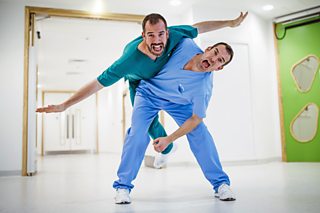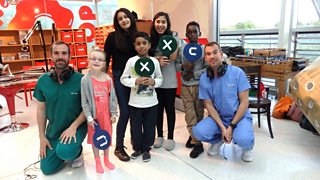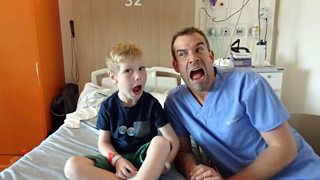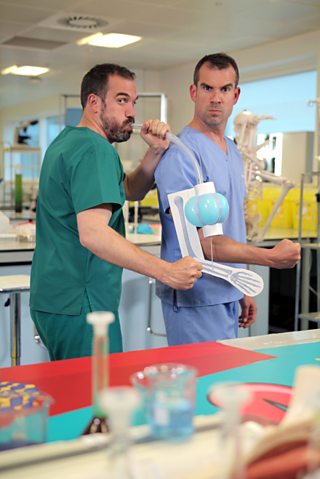BAFTA-winning Operation Ouch returns for a fifth series
Jon Jacob
Editor, About the Βι¶ΉΤΌΕΔ Blog

CΒι¶ΉΤΌΕΔ's BAFTA award-winning entertainment series about hospitals and the human body returns for a fifth series today. During a recent screening of series 5 we spoke to the presenters Dr Chris and Dr Xand and producers Kez and Ian about the programme.
Tell us what the programme is about
Kez: is the funniest, messiest most informative children’s series about human biology that you’ll ever see!
It seems like an obvious subject – there are plenty of other hospital-based docs – but how did making a series specific to children come about?
Kez: Ha - if you’re expecting a hospital-based doc then think again! This is the fifth season of the hugely popular Operation Ouch! series and we decided to do something a bit different. So while it’s business as usual when it comes to lots of the show, this time we’re basing a lot of what we do inside hospitals – including following four amazing outpatients throughout the ten episodes but much of their story is self-shot by the 'Ouch Patients' themselves.
For fans of the show there’s lots of familiar content too including the lab experiments which are bigger than ever and of course the A&E stories with funny animations. Since the first commission the show has grown to include a compulsive educational game '' and lots of digital extras. But our mission has remained the same: ‘your body is brilliant, look after it!'
You don’t shy away from the tough stories of the Ouch Patients have. You could have easily sanitised those stories. Why is telling them important?
Kez: Ruby, Holly, Haiden and Tola are all brilliant children with such resilience. But they’re not special or ‘different’, they are just kids. We wanted to show that – to show that children who might be missing a bit of school, or look a bit different, are just like you. The children have loved being involved and we wish them all the luck in the future.
If you were a kid again, visiting a hospital for the first time, how do you think this programme would help you?
Kez: We have so much anecdotal evidence from hospitals that the show has done wonders for relaxing children around their hospital experiences. We have even had quotes from parents too that when gently trying to explain to their child what is going to happen when they have their operation, they get cut off with a “Don’t worry I’ve seen it all on Operation Ouch!”
For the first time, as part of Hospital Takeover, we have loads of extra digital content that shows in fun 60 second videos what will happen when you go into hospital.

Dr. Xand, Emma, Soraya, Aaditya, Summer, Tola, Dr. Chris Evelina London, Children’s Hospital from episode two of the new series of Operation Ouch!
What challenges as programme makers did you face making the programme?
Ian: On Operation Ouch we are always tracking down new exciting medical developments and coming up with new areas and functions of the body to explore in the form of ever bigger experiments.
In this series we tested the strength of tendons in the body using a horse’s tendon to suspend Chris and Xand from a crane which involved a lot of careful preparation and planning.
Chris and Xand also love big, messy experiments in the lab – particularly when they can go head to head against each other – as when Xand had his peripheral vision blocked and then had to race against Chris to fill beakers with water. It went everywhere!
Drs Chris and Xand succeed in treading a fine line between entertaining and informing – what came first, the programme or them?
Ian: When we first met Chris and Xand their enthusiasm for medical investigations, natural humour and willingness to roll up their sleeves and experiment on themselves made them the perfect presenters for the series and since then we work very closely with them on all content on the show.
We have regular meetings to go through experiments and other elements so that they can give it all their own special brand of fun and humour. As they are both doctors we can also rely on them to put even more facts in. If any of the production team have any medical questions of their own, there are always two doctors on hand to give them immediate attention.

Harry with Dr. Chris at Alder Hey Children’s Hospital
How do you think children perceive hospitals?
Chris: I think a lot of it depends on their previous experience. I think a lot of kids find hospitals exciting and interesting places from looking at it on television, but you don’t need to spend long in hospitals especially when you’re feeling ill for them to become a frightening and unpleasant place which you dread. I think modern children’s hospitals really really go a long way to removing that dread.
Part of the role of Ouch is to entertain kids, to make them marvel and spectacle in their own bodies and to diminish fear of medical treatment. The programme gives them the confidence that if something bad goes wrong it won’t be too bad and someone can fix them. That is nearly always true.
Xand: Anecdotally, we definitely hear from nurses and doctors that watching Ouch makes them better patients. The programme helps them be less frightened, they ask questions, they’re better informed about their bodies – they can understand things a bit better. That’s the nicest compliment we can get. We’ve heard that on a few occasions.
Chris: I think its fair to say that by teaching them about going to the hospital, any subsequent visit becomes more fascinating than frightening because, for example, they know what the equipment on the wall is, or they understand the anaesthetist does. Hospital Takeover is trying to peel away all those layers, they understand that the hospital is an organism with cleaners and porters and chefs and its own postal system and executives and pilots and helicopters and all these different roles – not just doctors and nurses.
What’s your earliest memory of going into hospital?
Chris: I had a very frightening experience in hospital where I had been playing in a bonfire that I thought was out. A wire in the bonfire jumped up and burnt me with a huge slash. I went in. I was with Mum and Dad. The Doctor took me into a separate room away from Mum and Dad and said, did you parents do this to you? Of course I didn’t know what to say – I was so terrified at the thought that anyone would think this I just burst into tears I couldn’t speak – it must have made my parents look really guilty. That was over thirty years ago. Now there’s a completely different way of talking and relating to kids.
Xand: I was in hospital loads. I had loads of ear infections, tonsil-related issues – trouble with my adenoids. My first experience of an adenoid operation was filming Operation Ouch. I remember that was very minor and I got better and everyone was very nice to me. I think both of us had positive experiences in the hospital.

Dr. Xand and Dr. Chris demonstrate how the elbow works in The Science Lab: Don’t Try This At Βι¶ΉΤΌΕΔ
What are the challenges explaining complex medical issues to children?
Xand: With kids programmes we think it's really important that what you say is exactly right. Trying to be succinct and entertaining and not fudge any answers is really important. It’s a real challenge too.
Chris: Sometimes the team will come up with a lab experiment idea say involving the intestines. We’ll realise that the question we’re trying to answer is why the intestines don’t get all tangled. And we’ll end up re-purposing the experiment to show what the mesentery is. The mesentery is a thing that many adults haven't heard of.
So long as kids can wrap their heads around one new word, we can explain about this fantastic membrane that carries all the nerves and blood to and from the gut provided we dedicate it to the lab experiment to that bit of earlier knowledge. What’s challenging is trying to understand less charismatic organs. I think it’s those organs which kids get fascinated by. We’re trying to not just deal with the bits that everyone knows.
What’s the secret of Operation Ouch’s success?
Chris: The team that works on it. We are so lucky. You don’t win these two BAFTAs for best Children’s Factual without getting everything right in some way. We’re both a very small part of that process. It is phenomenal attention to detail.
Xand: The secret is that really good people work extremely hard. I would say even compared to being a junior doctor on call. When we are filming it is just relentless. Whatever else we’re doing goes on hold when we’re filming.
Chris: We would probably be prepared to cut a lot of corners, but it’s the directors who want things to be perfect. It’s the perfectionism on the team that’s so valuable.
Jon Jacob is Editor, About the Βι¶ΉΤΌΕΔ Blog
- is on CΒι¶ΉΤΌΕΔ Mondays from 5pm, starting Monday 31 October 2016.
